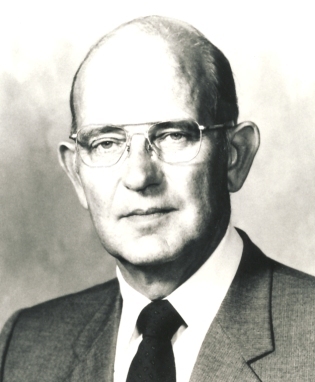1990 NATIONAL SPACE TROPHY RECIPIENT
Dr. Lew Allen

Dr. Lew Allen
Profile as published in the February 15, 1990 program book. Author unknown.
Dr. Lew Allen, Director of the Jet Propulsion Laboratory, is the recipient if the 1990 Rotary National Award for Space Achievement. Dr. Allen was chosen to be this year's honoree because of his distinguished contributions to the continuation of American's exploration of the solar system As Director of the Jet Propulsion Laboratory (JPL), Dr. Allen supervises NASA's main center for unmanned space exploration. Under his fine leadership, 1989 proved to be a banner year for unmanned space exploration. The spectacular flyby of Neptune by Voyager 2 and the successful launches of the Magellan and Galileo space probes rekindled the public's interest in our neighboring planets and their orbiting moons. The Jet Propulsion laboratory in Pasadena, California is chiefly responsible for these exciting missions that expand our knowledge and understanding for the universe.
Last August, Voyager 2 treated the entire world to breathtaking views of distant Neptune. The flight controllers at JPL tuned its trajectory so accurately that Voyager 2 reached Neptune only 21 miles from where scientists expected it to be. Closing in on the stormy planet, Voyager 2 discovered six previously unknown moons and at least four rings. Because of its brilliant design and careful manipulation from JPL, Voyager 2 is still sending data 2.8 billion miles back to Earth.
Voyager 2 has proven itself to e the most successful space probe ever launched. Designed and built at JPL, the space probe, and its sister, Voyager 1, have provided most of our knowledge about our Solar System. This prompted noted astronomer Carl Sagan to say, "Those scientists and engineers are role models in an America seeking excellence and international competiveness. They should be on our stamps."
The space probes Magellan and Galileo were launched from Space Shuttles in a convenient cooperative effort of manned and unmanned space flights. Magellan will orbit Venus, the cloud-covered twin planet of Earth, and map its hidden surface with imaging radar. Galileo will orbit Jupiter and send a probe into that planet's atmosphere for the first direct sampling of the clouds covering the largest planet in our solar system.
Dr. Allen has been director of the Jet Propulsion laboratory since 1982. Early in his tenure, Dr. Allen pledged to maintain a vigorous space science program while pursuing new avenues of research and development for other significant problems of national and global interest. In 1983, Dr. Allen established the Infrared Processing and Analysis Center (IRAS). The IRAS is operated by JPL and the California Institute of Technology to give astronomers access to this wealth of data.
Dr. Allen is providing the impetus and leadership for future programs. Planetary flight missions currently in development at JL include the Mars Observer, scheduled for launch in 1992. It will be the first of a new class of spacecraft called Planetary Observers. Also under study at JPL is the Comet Rendezvous Asteroid Flyby (CRAF) project, the first of the Mariner Mark II missions.
Dr. Allen is a graduate of the United States Military Academy at West Point. He has a master of science degree and a doctorate in physics. In his varied career, Dr. Allen has held the rank of General and served as Air Force Chief of Staff. He was a member of the Joint Chiefs of Staff, serving as a principal military adviser to the Secretary of Defense, the National Security Council and the President. Dr. Allen has been honored with many prestigious awards including the American Achievement Award and Distinguished Service Medals from the National Intelligence Agency and the Air Force.
The Rotary National Award for Space Achievement Foundation is proud to name Dr. Lew Allen the recipient of the 1990 National Space Trophy.
